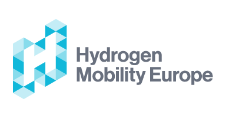Hydrogen Mobility Europe (H2ME), a collaboration among national H2 Mobility initiatives from across Europe aiming to support the early rollout of hydrogen vehicles, has launched its second deployment of hydrogen refueling infrastructure and passenger and commercial fuel cell electric vehicles (FCEVs).
Through the six-year H2ME 2 project, 37 partners from across Europe will work to deploy and operate 1,230 FCEVs, add 20 extra hydrogen refueling stations to the European network, and test the ability of electrolyser hydrogen refueling stations to help balance the electrical grid. The project has been supported by the Fuel Cells and Hydrogen Joint Undertaking (FCH JU), with funding from the European Union (EU) Horizon 2020 program.
According to the collaboration, the H2ME 2 project will build on the first FCH JU-funded project developed by H2ME partners, which was announced in September 2015, with plans for 300 fuel cell vehicles and 29 hydrogen refueling stations. Together, the two H2ME projects will form the largest EU-funded project for hydrogen mobility and FCEV deployment, according to the collaboration.
The EUR 100 million H2ME 2 project, funded with a further EUR 35 million grant from the FCH JU, will significantly expand the European hydrogen vehicles fleet and will produce recommendations and identify any gaps that may prevent full commercialization.
“New French hydrogen refueling stations are currently planned in the Rhône-Alps Green Hydrogen Corridor, as well as in Bordeaux, Nancy, Nantes and Paris,” says Fabio Ferrari, coordinator of the French consortium and CEO of Symbio FCell, speaking on behalf of the French H2 Mobility partners. “The project will result in a large deployment of utility vehicle fleets. These fleets are made up of light vans, small trucks, as well as a taxi fleet of 60 full fuel cell-powered vehicles in the greater Paris area.”
“If fuel cell cars are to become a well-established product – and, with them, the use of hydrogen as a fuel – the availability of infrastructure for refueling is key,” says Nikolas Iwan, managing director of the Joint Venture H2 Mobility Deutschland GmbH & Co. KG and coordinator for the German activities under H2ME. “It is very important that infrastructure companies and car manufacturers exchange information to minimize the risk and focus the expertise around standardization and network planning to make the most out of the provided funds by governments.”







